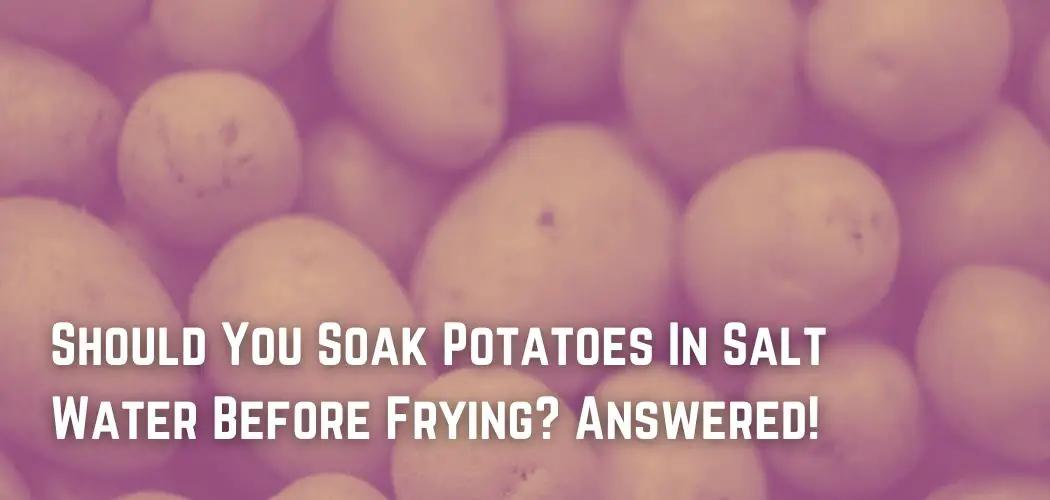Potatoes are a staple food in many households and are commonly used in a variety of recipes, including fried dishes.
However, some people believe that soaking potatoes in salt water before frying them can improve their taste and texture. So, should you soak potatoes in salt water before frying them? Let’s take a closer look.

First, let’s consider the reasons why people recommend soaking potatoes in salt water. The main argument is that the salt water helps to remove excess starch from the potatoes.
This can make the potatoes crispier and prevent them from sticking together when fried. Additionally, some people believe that soaking the potatoes in salt water can help to enhance their flavor.
On the other hand, there are also some arguments against soaking potatoes in salt water. One concern is that soaking the potatoes for too long can make them mushy and affect their texture when fried. Another concern is that the salt water can cause the potatoes to absorb too much salt, making them overly salty.
So, what should you do? Well, there isn’t a one-size-fits-all answer to this question, as it depends on personal preference and the recipe you’re using. However, there are a few things to keep in mind.
If you’re making French fries or another recipe that requires the potatoes to be crispy, soaking them in salt water for around 30 minutes can help to remove excess starch and improve their texture.
However, it’s important not to soak them for too long, as this can make them mushy. Additionally, it’s important to rinse the potatoes well after soaking them to remove any excess salt.
If you’re making a recipe that requires the potatoes to be soft and tender, such as mashed potatoes or potato soup, then there’s no need to soak them in salt water. In fact, doing so could make them overly salty.
Soaking potatoes in salt water before frying can be a good idea for some recipes, as it can help to remove excess starch and improve their texture.
However, it’s important not to soak them for too long, and to rinse them well after soaking to remove any excess salt. Ultimately, the decision to soak or not to soak should be based on personal preference and the specific recipe you’re using.
Contents
Health Benefits Associated With Soaking In Salt Water
There are several health benefits to soaking potatoes in salt water before frying them. Here are some of the most notable ones:
- Reduces Acrylamide Formation: When potatoes are fried at high temperatures, they can produce a harmful substance called acrylamide. Acrylamide has been linked to an increased risk of cancer and other health problems. Soaking potatoes in salt water before frying can help to reduce acrylamide formation by removing excess starch, which is a precursor to acrylamide.
- Improves Digestion: Soaking potatoes in salt water can also help to improve their digestion. The salt water helps to break down the complex carbohydrates in potatoes into simpler, more easily digestible forms. This can help to reduce bloating, gas, and other digestive issues.
- Increases Nutrient Absorption: Soaking potatoes in salt water can also help to increase the absorption of nutrients. The salt water helps to break down the cell walls of the potatoes, making it easier for the body to absorb the vitamins and minerals that they contain. This can help to improve overall health and reduce the risk of nutrient deficiencies.
- Enhances Flavor: Soaking potatoes in salt water can also help to enhance their flavor. The salt water can help to draw out some of the natural sugars in the potatoes, giving them a slightly sweeter flavor. This can make them more enjoyable to eat and may encourage people to consume more potatoes, which are a good source of fiber, vitamins, and minerals.
- Reduces Sodium Absorption: Contrary to popular belief, soaking potatoes in salt water before frying does not necessarily result in overly salty potatoes. In fact, soaking the potatoes in salt water can actually help to reduce the amount of sodium that they absorb during frying. This is because the salt water helps to create a protective barrier on the surface of the potatoes, preventing them from absorbing too much oil and salt.
Soaking potatoes in salt water before frying them can have several health benefits, including reducing acrylamide formation, improving digestion, increasing nutrient absorption, enhancing flavor, and reducing sodium absorption.

However, it’s important to keep in mind that soaking the potatoes for too long can make them mushy, so it’s best to soak them for no more than 30 minutes before frying.
Can Help Prevent Discoloration
Soaking potatoes in salt water before frying can help to prevent discoloration. When potatoes are cut or peeled, they can quickly turn brown due to exposure to oxygen.
This is because the enzymes in the potatoes react with oxygen to produce a brown pigment called melanin.

Soaking the potatoes in salt water before frying can help to prevent discoloration by slowing down the enzyme activity. The salt in the water helps to create a slightly acidic environment, which can help to slow down the enzyme activity and prevent the potatoes from turning brown.
However, it’s important to keep in mind that soaking the potatoes in salt water for too long can make them mushy and affect their texture when fried. So, it’s best to soak them for no more than 30 minutes before frying, and to rinse them well after soaking to remove any excess salt.
Conclusion
Soaking potatoes in salt water before frying them can have several benefits, including improving their texture, reducing acrylamide formation, enhancing flavor, improving digestion, increasing nutrient absorption, and preventing discoloration.
However, it’s important to keep in mind that soaking the potatoes for too long can make them mushy, and to rinse them well after soaking to remove any excess salt.
Ultimately, whether or not to soak potatoes in salt water before frying them depends on personal preference and the specific recipe being used. However, for recipes that require crispy potatoes, soaking them for around 30 minutes in salt water can be a good idea to improve their texture and reduce acrylamide formation.
